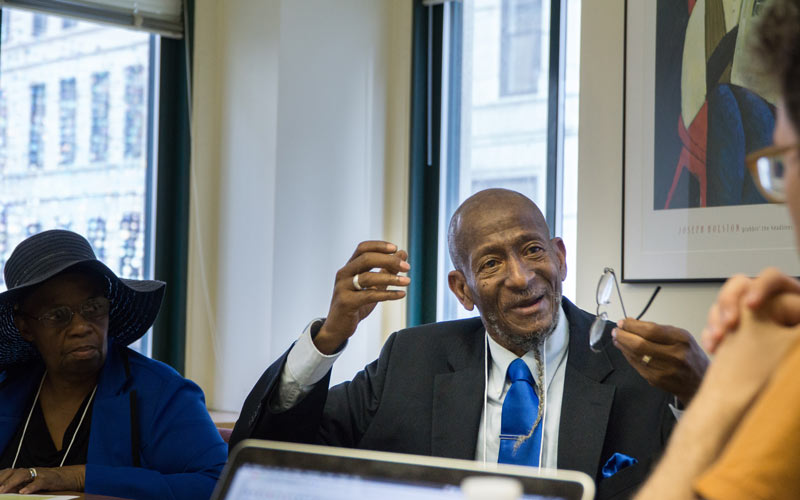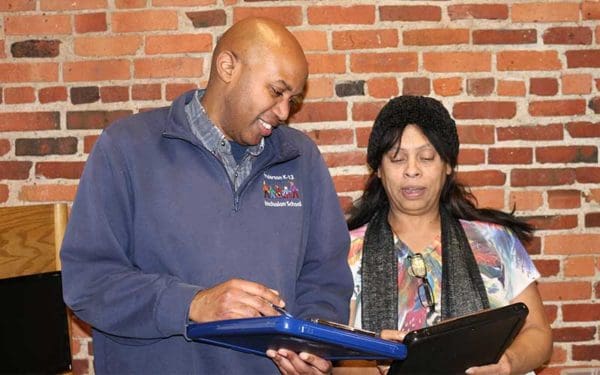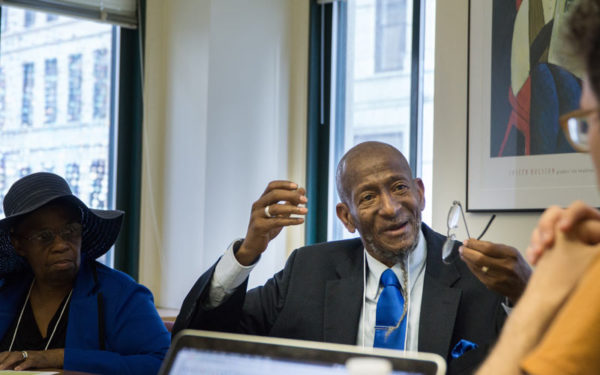
Resident researchers with the Healthy Neighborhood Study have a unique voice that influences the path and impact of the research they conduct. Photo: Healthy Neighborhood Study.
Most of us have given a minute of our time to answer a survey. A person holding a clipboard asks questions and captures information. But who actually comes up with these questionnaires? More often than not, it’s a group of social scientists or academics. But ironically, the perspectives and experiences of the communities that the research claims to be about are rarely taken into account. And, most community members never get to see or act based on what the researchers found about their lives.
By design, the Healthy Neighborhoods Study (HNS) does just the opposite. The multi-year study, developed in concert with CLF and MIT’s Department of Urban Studies and Planning, looks at the relationship between health and housing alongside community partners and residents in nine Massachusetts communities.
Resident Researchers are essential in putting the experiences, perspectives, and voices of residents first. They determine the questions being asked, influence the path the research follows, and conduct the on-the-ground surveys. They are neighbors talking to neighbors to understand the issues that deeply affect their communities every day.
I had the pleasure of meeting Carl Baty, a Resident Researcher from Dorchester who has worked on the study since its start in 2015. We spoke about his experience working with CLF, MIT, and Codman Square Neighborhood Development Corporation to develop the study and the ways that it has impacted him and his community.
The following interview has been edited for clarity.
How did you get involved in the Healthy Neighborhood Study?
A friend and I had created a nonprofit [Rounding the Bases]. And, while working on this community project, I met a gentleman, Trey [Youmans, Codman Square Neighborhood Development Corporation]. He asked me if I would be part of the Healthy Neighborhoods Study. But, like most African Americans or Blacks, I’ve had some terrible experiences with research. So, I was kind of leery at first. But the people seemed friendly, and I trusted Trey – so, I trusted them.
What has made this research work different?
I remember the first meeting. We were sitting in the office with Andrew [Binet] and Leigh [Caroll] from MIT, Vedette [Gavin, CLF], and a doctoral student who I called Doc. After they explained the ideas, I told them that their study wasn’t going to work. “Why would we put out a survey to find out what we already know?” I told them. So, they asked me: “What should we do, then?”
Even though I didn’t have an answer, they still listened. They went back and started working on something different. We still did surveys, but we made them up together. It was more than just “take this paper and go ask people some questions.” It was a good feeling. It was a two-way street.
We got the understanding that you have to create a relationship first. You’ve got to build trust with people. That’s why we came a long way with this project – the researchers were always ready to listen.
How would you describe your role in this project?
Well, you have the academics – they do all the data analysis about the problems we need to fix. You got the intellectuals – smart enough to figure the systems. You got somebody that I call the translator because they know how to speak all these different languages.
And then, you’ve got the average guy, who just walked into this mess. But, he knows all the things that need to get fixed about the mess. That’s been his whole life – that’s me. And we all work together to understand and fix the issues we see.
In what ways do you see this research impacting your community?
[At Rounding the Bases, for example], everything that we’ve been doing has been based on what we learned in the survey in this project.
The most important thing that we learned is that the better a person can meet their priorities, the better their reported health. So what do we need to do? We need to help people meet their priorities. We identified food insecurity. So, we started food delivery for seniors. We started simply with one farm – and that was three years ago. We did this through the Resiliency Fund [a Boston City Grant Program for COVID-19 relief]. And, we are already working on the second grant.
Just during September [2020], I worked with the Resiliency Fund, and we delivered 500 pounds of vegetables five days a week to the Boston Housing Authority at different senior buildings.
This is all to say that we would have no idea that there is that much food insecurity if we weren’t doing this study.
How has this study impacted you personally?
I’ll tell you something. I remember we were in a meeting with Leigh [Caroll, MIT]. She was saying something, and I responded: “If all I was ever meant to have was a cotton sack on my back, what difference does it make?” I didn’t think no more about it. She was writing her thesis at the time, so she quoted me and sent me a copy. But when I read the quote on her thesis, I emailed her to apologize that I sounded so angry. She said, “No, Carl. I didn’t think it was angry. And if you were angry, you had a reason to be.”
I woke up that night. I was sound asleep, and that was the only thing that kept ringing in my mind. I was 65 years old. And this was the first time in my life that anybody had told me I had a reason to be angry. I started realizing that this thing was as healing for me as it could be for anybody else. And it has been happening over, and over, and over.
When you do surveys, you’re talking to people. And, at some point, people are going to tell you whatever about themselves. In that moment, you’ve got to build an ongoing relationship – and there has to be a way that you can refrain from judgment.
I tell people: “It’s all right. It’s just all right. You’re doing exactly what you’re supposed to be doing.”
I think to myself, “the same way that those thoughts heal you, give those thoughts to somebody else – pass it to the next person.”
What would you tell your past self about this project?
I would tell him: “You are going to find friends here that you didn’t know you were going to have. Regardless of what it looks like when it first starts, just hang in there.”
You see. Andrew [Binet/MIT] and I used to have some battles. Oh, we would have some battles! A lot of times, you’re taught in life that it’s either black or it’s white. It’s either right or it’s wrong. That’s not always true.
The most important thing is that there can be more than one right. Just got to keep your mind open. I know that after these years, that’s the best advice I could give myself.
What would you like to tell other community members about this project?
We’ve had some bad experiences with research. But, we need to get beyond what we’ve been taught. Because if we don’t get to take part in research, then we have no voices. Nobody knows anything about us. We have to take part in research for our voice to be heard. And we’ve got to realize that not everybody means us harm.
Are there any last words that you would like to share today with me?
I really want to thank you because, you know, you go on this journey of self-discovery in life, to find out who you are, and it’s not until you start talking to somebody about it that it really becomes real. These are conversations that you just need to have, so it’s good to have them. Thank you for taking a look at it and helping me take a look at myself.


